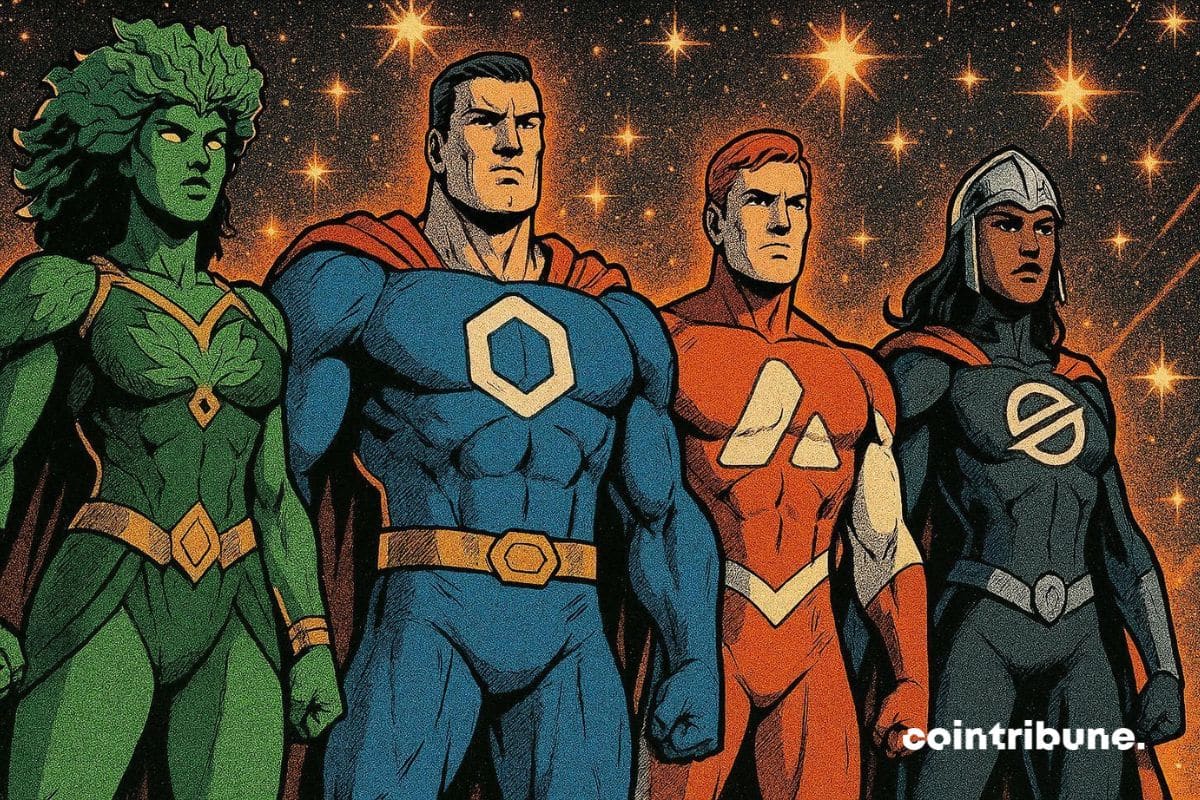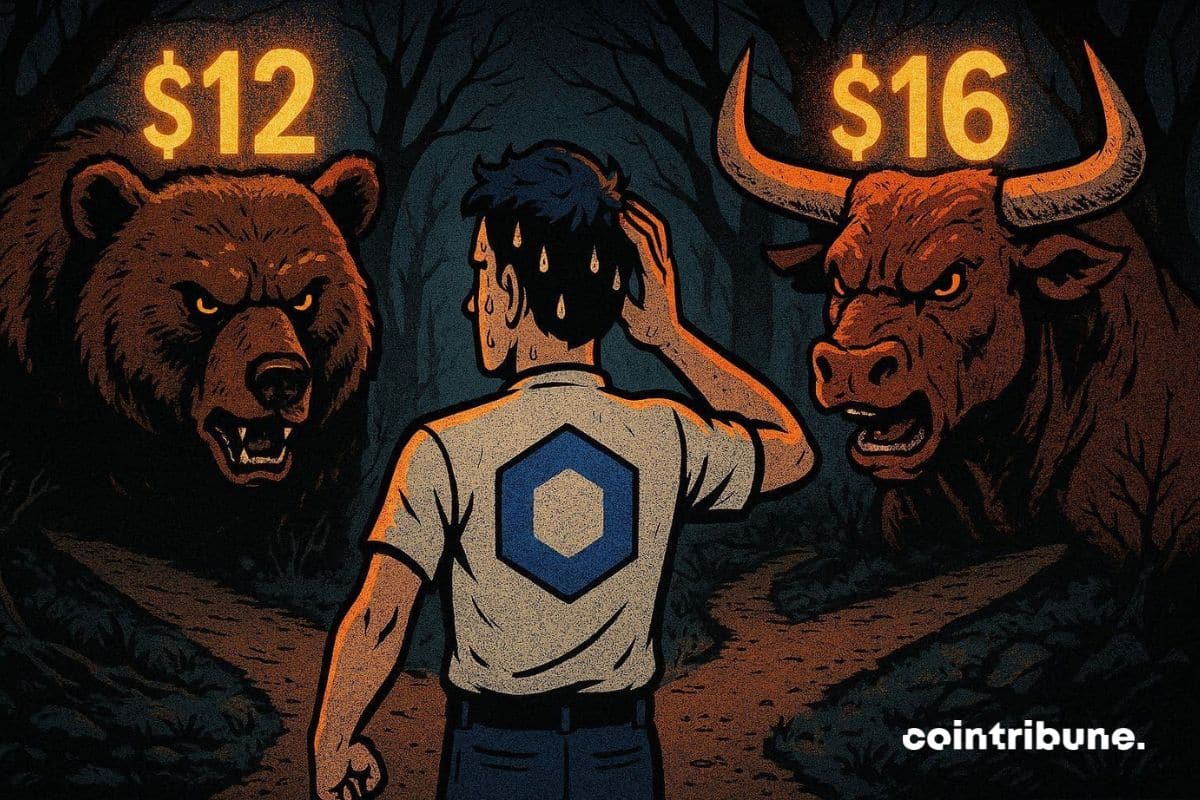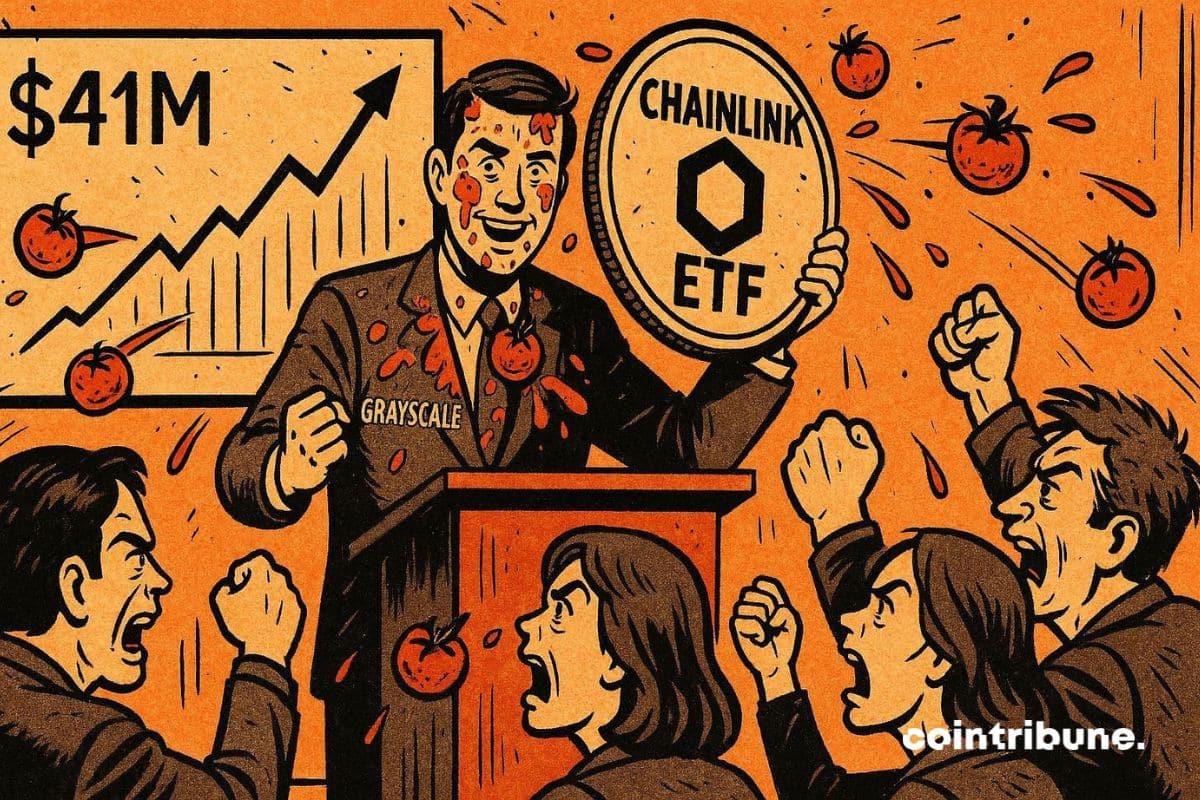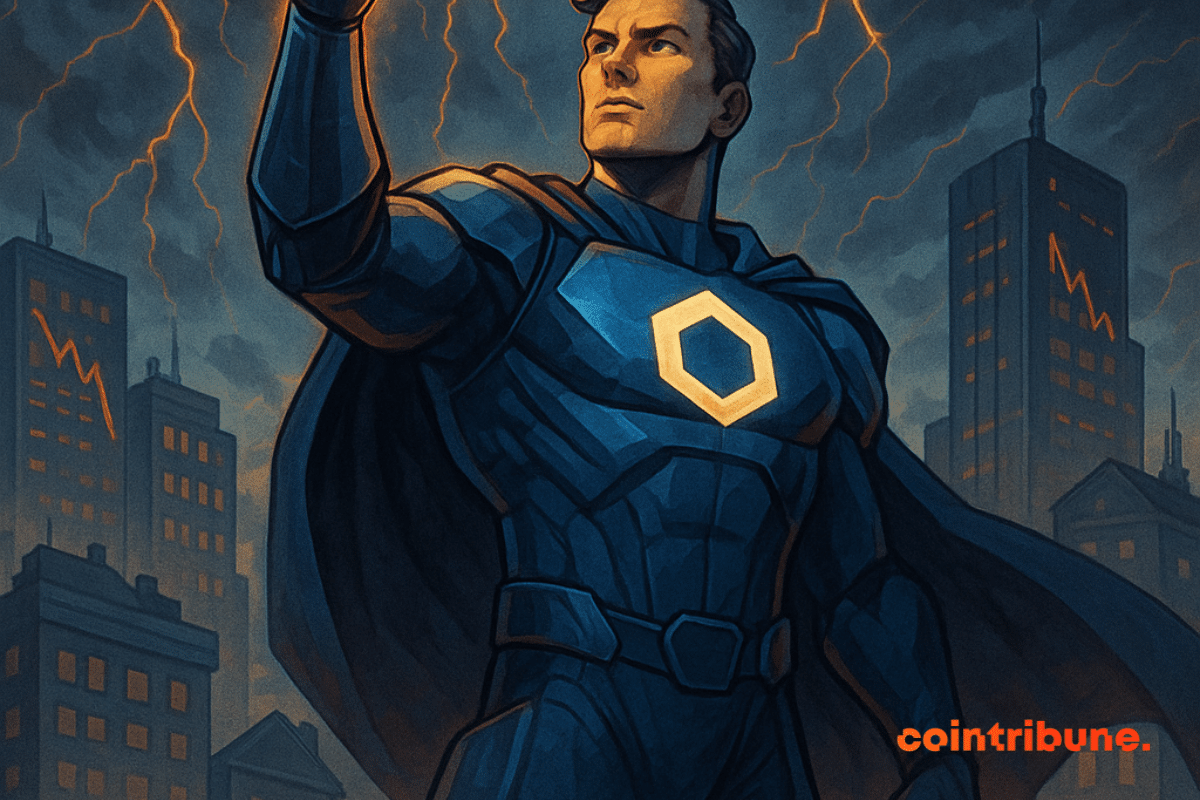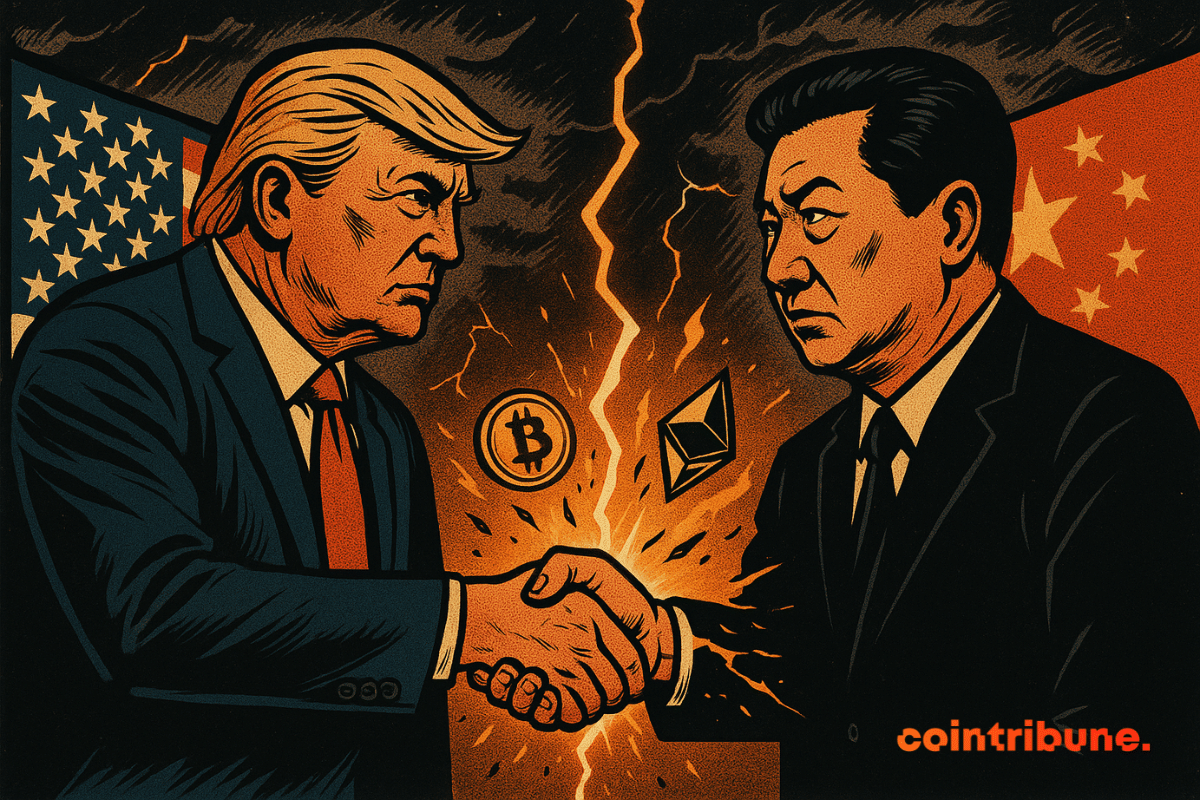
Cours Chainlink
LINK
Prix
12,68 $
BTC
0,000150 ₿
1H % ROI
0.14%
24H % ROI
1.62%
7J % ROI
1.20%
Volume 24h
229 767 000,00 $
Offre disponible
657 099 970 LINK
Offre totale
0 LINK
Rang
12
Capitalisation
8 329 710 000 $
Le cours du Chainlink (LINK) se chiffre à 12,68 USD ce mercredi 4 février 2026, en baisse de 1,62% sur une période de 24 heures. La capitalisation boursière de cette cryptomonnaie s'établit à 8.33 milliards $, et le volume d'échanges s'élève à 229.77 millions $ sur la même période. LINK est rang #12 dans le classement des cryptomonnaies selon leur market cap.
Valeur du Chainlink
Convertisseur de capitalisation
- Bitcoin (BTC)
- Ethereum (ETH)
- Tether USDt (USDT)
- BNB (BNB)
- USDC (USDC)
- XRP (XRP)
- Cardano (ADA)
- Dogecoin (DOGE)
- Solana (SOL)
- Polkadot (DOT)
- Litecoin (LTC)
- BUSD (BUSD)
- Shiba Inu (SHIB)
- TRON (TRX)
- Avalanche (AVAX)
- Dai (DAI)
- UNUS SED LEO (LEO)
- Cosmos (ATOM)
- Uniswap (UNI)
- Monero (XMR)
- OKB (OKB)
- Toncoin (TON)
- Ethereum Classic (ETC)
- Stellar (XLM)
- Internet Computer (ICP)
- Bitcoin Cash (BCH)
- Filecoin (FIL)
- TrueUSD (TUSD)
- Aptos (APT)
- Hedera (HBAR)
- Lido DAO (LDO)
- Arbitrum (ARB)
- NEAR Protocol (NEAR)
- Cronos (CRO)
- VeChain (VET)
- ApeCoin (APE)
- Algorand (ALGO)
- Quant (QNT)
- The Graph (GRT)
- EOS (EOS)
- The Sandbox (SAND)
- Decentraland (MANA)
- Theta Network (THETA)
- Stacks (STX)
- Aave (AAVE)
- MultiversX (EGLD)
- Pax Dollar (USDP)
- Tezos (XTZ)
- Flow (FLOW)
- Axie Infinity (AXS)
- Rocket Pool (RPL)
- Chiliz (CHZ)
- Immutable (IMX)
- Conflux (CFX)
- KuCoin Token (KCS)
- Neo (NEO)
- Curve DAO Token (CRV)
- Render (RENDER)
- USDD (USDD)
- Optimism (OP)
- Maker (MKR)
- Injective (INJ)
- Bitcoin SV (BSV)
- Terra Classic (LUNC)
- Synthetix (SNX)
- GMX (GMX)
- BitTorrent [New] (BTT)
- Zcash (ZEC)
- Mina (MINA)
- Frax Share (FXS)
- Dash (DASH)
- eCash (XEC)
- XDC Network (XDC)
- Casper (CSPR)
- IOTA (IOTA)
- PAX Gold (PAXG)
- PancakeSwap (CAKE)
- GateToken (GT)
- Trust Wallet Token (TWT)
- Zilliqa (ZIL)
- Gemini Dollar (GUSD)
- Flare (FLR)
- Loopring (LRC)
- WOO (WOO)
- THORChain (RUNE)
- Convex Finance (CVX)
- dYdX (ethDYDX) (ETHDYDX)
- 1inch Network (1INCH)
- Enjin Coin (ENJ)
- Kava (KAVA)
- Nexo (NEXO)
- Basic Attention Token (BAT)
- Osmosis (OSMO)
- Mask Network (MASK)
- Oasis (ROSE)
- FLOKI (FLOKI)
- Ethereum Name Service (ENS)
- NEM (XEM)
- Holo (HOT)
- Terra (LUNA)
- EthereumPoW (ETHW)
- Ankr (ANKR)
- Audius (AUDIO)
- Solar (SXP)
- Theta Fuel (TFUEL)
- Qtum (QTUM)
- Celo (CELO)
- Balancer (BAL)
- Compound (COMP)
- Ravencoin (RVN)
- Chia (XCH)
- JasmyCoin (JASMY)
- ssv.network (SSV)
- Artificial Superintelligence Alliance (FET)
- Decred (DCR)
- Threshold (T)
- Blur (BLUR)
- Astar (ASTR)
- ICON (ICX)
- Gala (GALA)
- Harmony (ONE)
- Gnosis (GNO)
- Helium (HNT)
- yearn.finance (YFI)
- Kusama (KSM)
- Arweave (AR)
- Bitcoin Gold (BTG)
- Treasure (MAGIC)
- Bone ShibaSwap (BONE)
- SushiSwap (SUSHI)
- GMT (GMT)
- IoTeX (IOTX)
- Golem (GLM)
- JUST (JST)
- MX Token (MX)
- Moonbeam (GLMR)
- 0x Protocol (ZRX)
- Waves (WAVES)
- Siacoin (SC)
- Kadena (KDA)
- Ontology (ONT)
- Band Protocol (BAND)
- DAO Maker (DAO)
- SPACE ID (ID)
- Alchemy Pay (ACH)
- MobileCoin (MOB)
- Reserve Rights (RSR)
- Biconomy (BICO)
- IOST (IOST)
- Hive (HIVE)
- TerraClassicUSD (USTC)
- Four (FORM)
- Cartesi (CTSI)
- Flux (FLUX)
- WAX (WAXP)
- SKALE (SKL)
- BORA (BORA)
- aelf (ELF)
- Symbol (XYM)
- SwissBorg (BORG)
- Celer Network (CELR)
- Liquity (LQTY)
- JOE (JOE)
- SafePal (SFP)
- Bitgert (BRISE)
- OMG Network (OMG)
- Nervos Network (CKB)
- Core (CORE)
- Livepeer (LPT)
- DigiByte (DGB)
- Dogelon Mars (ELON)
- Amp (AMP)
- Storj (STORJ)
- Keep Network (KEEP)
- OriginTrail (TRAC)
- Illuvium (ILV)
- UMA (UMA)
- Horizen (ZEN)
- Stargate Finance (STG)
- Aragon (ANT)
- Secret (SCRT)
- iExec RLC (RLC)
- Lisk (LSK)
- Metis (METIS)
- API3 (API3)
- Radix (XRD)
- Frax (FRAX)
- FTX Token (FTT)
- Bitget Token (BGB)
- Tether Gold (XAUT)
- Kaspa (KAS)
- Baby Doge Coin (BABYDOGE)
- WEMIX (WEMIX)
- USDJ (USDJ)
- Liquity USD (LUSD)
- Ronin (RON)
- Beldex (BDX)
- Gains Network (GNS)
- Telcoin (TEL)
- inSure DeFi (SURE)
- STASIS EURO (EURS)
- MVL (MVL)
- Decentralized Social (DESO)
- VVS Finance (VVS)
- Braintrust (BTRST)
- Rootstock Infrastructure Framework (RIF)
- Pundi X (New) (PUNDIX)
- Polymesh (POLYX)
- Hashflow (HFT)
- Kyber Network Crystal v2 (KNC)
- Everscale (EVER)
- MediBloc (MED)
- Synapse (SYN)
- Axelar (AXL)
- DeXe (DEXE)
- Decimal (DEL)
- Syscoin (SYS)
- Coin98 (C98)
- Smooth Love Potion (SLP)
- LooksRare (LOOKS)
- Nano (XNO)
- Chromia (CHR)
- Locus Chain (LOCUS)
- ConstitutionDAO (PEOPLE)
- Radiant Capital (RDNT)
- Numeraire (NMR)
- Artificial Liquid Intelligence (ALI)
- Civic (CVC)
- Status (SNT)
- Ultra (UOS)
- APENFT (NFT)
- Gitcoin (GTC)
- MiL.k (MLK)
- Dent (DENT)
- COTI (COTI)
- Ergo (ERG)
- Ontology Gas (ONG)
- Hooked Protocol (HOOK)
- Vulcan Forged (PYR) (PYR)
- Ren (REN)
- STP (STPT)
- MOBOX (MBOX)
- Venus (XVS)
- dKargo (DKA)
- Request (REQ)
- Steem (STEEM)
- Prom (PROM)
- Hippocrat (HPO)
- Radworks (RAD)
- Ardor (ARDR)
- Orbs (ORBS)
- NYM (NYM)
- Pendle (PENDLE)
- Centrifuge (CFG)
- VeThor Token (VTHO)
- Powerledger (POWR)
- Ribbon Finance (RBN)
- WINkLink (WIN)
- Wilder World (WILD)
- NKN (NKN)
- Stella (ALPHA)
- Energy Web Token (EWT)
- Marlin (POND)
- Bancor (BNT)
- Viction (VIC)
- MARBLEX (MBX)
- e-Radix (EXRD)
- Metal DAO (MTL)
- Phala Network (PHA)
- Orchid (OXT)
- IQ (IQ)
- MyNeighborAlice (ALICE)
- Oasys (OAS)
- Spell Token (SPELL)
- Highstreet (HIGH)
- DODO (DODO)
- XPLA (XPLA)
- Shentu (CTK)
- Dusk (DUSK)
- Creditcoin (CTC)
- Alien Worlds (TLM)
- QuarkChain (QKC)
- Onyxcoin (XCN)
- Loom Network (LOOM)
- XSGD (XSGD)
- Pirate Chain (ARRR)
- RACA (RACA)
- Seedify.fund (SFUND)
- Verasity (VRA)
- FUNToken (FUN)
- Bifrost (BFC)
- WazirX (WRX)
- World Mobile Token (WMTX)
- CEEK VR (CEEK)
- Aura Finance (AURA)
- TrueFi (TRU)
- XYO (XYO)
- SuperVerse (SUPER)
- Venus BUSD (VBUSD)
- Automata Network (ATA)
- Origin Protocol (OGN)
- Volt Inu (VOLT)
- StormX (STMX)
- Toko Token (TKO)
- Concordium (CCD)
- Aergo (AERGO)
- ASD (ASD)
- xMoney (UTK)
- Metacraft (MCT)
- Yield Guild Games (YGG)
- RSS3 (RSS3)
- Sologenic (SOLO)
- Ark (ARK)
- Sun [New] (SUN)
- Badger DAO (BADGER)
- EURC (EURC)
- DAR Open Network (D)
- Acala Token (ACA)
- Moonriver (MOVR)
- Nexera (NXRA)
- Ampleforth Governance Token (FORTH)
- IDEX (IDEX)
- MovieBloc (MBL)
- Cobak Token (CBK)
- Wanchain (WAN)
- Ampleforth (AMPL)
- AXEL (AXEL)
- Metadium (META)
- Aavegotchi (GHST)
- RichQUACK.com (QUACK)
- Telos (TLOS)
- ARPA (ARPA)
- Strike (STRK)
- OG Fan Token (OG)
- Electroneum (ETN)
- Komodo (KMD)
- Klever Coin (KLV)
- Raydium (RAY)
- Perpetual Protocol (PERP)
- LCX (LCX)
- Velas (VLX)
- Constellation (DAG)
- sUSD (SUSD)
- ThunderCore (TT)
- Gods Unchained (GODS)
- ZEON (ZEON)
- Adshares (ADS)
- Bella Protocol (BEL)
- Cortex (CTXC)
- PlatON (LAT)
- SuperRare (RARE)
- FirmaChain (FCT)
- LTO Network (LTO)
- DeFi Pulse Index (DPI)
- Enzyme (MLN)
- Polkastarter (POLS)
- Hunt Town (HUNT)
- Celo Dollar (CUSD)
- QuickSwap [Old] (QUICK)
- Epic Chain (EPIC)
- Vanar Chain (VANRY)
- Sweat Economy (SWEAT)
- Hifi Finance (HIFI)
- GameFi.org (GAFI)
- FC Barcelona Fan Token (BAR)
- Uquid Coin (UQC)
- Verge (XVG)
- Persistence One (XPRT)
- Opulous (OPUL)
- Boba Network (BOBA)
- DEXTools (DEXT)
- Phoenix (PHB)
- Moss Coin (MOC)
- Beefy (BIFI)
- Quickswap [New] (QUICK)
- League of Kingdoms Arena (LOKA)
- BakeryToken (BAKE)
- Adventure Gold (AGLD)
- Bounce Token (AUCTION)
- Propy (PRO)
- Alpine F1 Team Fan Token (ALPINE)
- Wirex Token (WXT)
- CLV (CLV)
- Groestlcoin (GRS)
- Defigram (DFG)
- Gelato (GEL)
- DIA (DIA)
- Akash Network (AKT)
- BENQI (QI)
- TokenPocket (TPT)
- AVA (Travala) (AVA)
- Alchemix (ALCX)
- RAMP (RAMP)
- Chainbounty (BOUNTY)
- Gas (GAS)
- Star Atlas DAO (POLIS)
- NEOPIN (NPT)
- AhaToken (AHT)
- Alpha Quark Token (AQT)
- MAP Protocol (MAPO)
- Maple (MPL)
- LeverFi (LEVER)
- MonaCoin (MONA)
- Measurable Data Token (MDT)
- Aurora (AURORA)
- Tranchess (CHESS)
- Star Atlas (ATLAS)
- Contentos (COS)
- Dego Finance (DEGO)
- Altura (ALU)
- Tokenlon Network Token (LON)
- Streamr (DATA)
- GoМining (GOMINING)
- REI Network (REI)
- StaFi (FIS)
- Ellipsis (EPS)
- Paris Saint-Germain Fan Token (PSG)
- H2O DAO (H2O)
- AdEx (ADX)
- Bluzelle (BLZ)
- dForce (DF)
- APX (APX)
- Elastos (ELA)
- Minswap (MIN)
- CoinEx Token (CET)
- FIO Protocol (FIO)
- S.S. Lazio Fan Token (LAZIO)
- Splintershards (SPS)
- Tellor (TRB)
- Hermez Network (HEZ)
- Forta (FORT)
- MANTRA (OM)
- Harvest Finance (FARM)
- Boson Protocol (BOSON)
- FC Porto Fan Token (PORTO)
- Santos FC Fan Token (SANTOS)
- AIOZ Network (AIOZ)
- PIVX (PIVX)
- Namecoin (NMC)
- Nakamoto Games (NAKA)
- RARI (RARI)
- XPR Network (XPR)
- GYEN (GYEN)
- HOPR (HOPR)
- DIMO (DIMO)
- Hacken Token (HAI)
- Velo (VELO)
- DEAPcoin (DEP)
- PARSIQ (PRQ)
- Galatasaray Fan Token (GAL)
- Mango (MNGO)
- Pepe (PEPE)
- Sui (SUI)
- Open Campus (EDU)
- ORDI (ORDI)
- Milady Meme Coin (LADYS)
- Tokamak Network (TOKAMAK)
- ArbDoge AI (AIDOGE)
- Dione Protocol (DIONE)
- SmarDex (SDEX)
- ParaSwap (PSP)
- Aleph Cloud (ALEPH)
- BitMart Token (BMX)
- StrikeX (STRX)
- district0x (DNT)
- Hathor (HTR)
- Solana Name Service (FIDA)
- Delysium (AGI)
- BIDR (BIDR)
- ChainGPT (CGPT)
- PolySwarm (NCT)
- Solend (SLND)
- Goldfinch (GFI)
- Diamond Launch (DLC)
- Assemble AI (ASM)
- Green Satoshi Token (SOL) (GST)
- Sperax (SPA)
- Sovryn (SOV)
- Tokemak (TOKE)
- Samoyedcoin (SAMO)
- AMO Coin (AMO)
- MATH (MATH)
- Zano (ZANO)
- Suku (SUKU)
- Clearpool (CPOOL)
- Arcblock (ABT)
- MixMarvel (MIX)
- Counterparty (XCP)
- Victoria VR (VR)
- Kryll (KRL)
- Quantum Resistant Ledger (QRL)
- SpaceN (SN)
- Stader (SD)
- Shapeshift FOX Token (FOX)
- Hegic (HEGIC)
- Numbers Protocol (NUM)
- BLOCKv (VEE)
- Quiztok (QTCON)
- Cratos (CRTS)
- Kishu Inu (KISHU)
- Doge Killer (LEASH)
- Indigo Protocol (INDY)
- Comtech Gold (CGO)
- Vita Inu (VINU)
- XeniosCoin (XNC)
- Rupiah Token (IDRT)
- SIDUS (SIDUS)
- UNS TOKEN (UNS)
- SIX (SIX)
- SuperWalk (GRND)
- MileVerse (MVC)
- Agoras: Tau Net (AGRS)
- ELYSIA (EL)
- Oraichain (ORAI)
- SpaceChain (SPC)
- Across Protocol (ACX)
- Observer (OBSR)
- SHPING (SHPING)
- Maverick Protocol (MAV)
- Neutron (NTRN)
- ALEX Lab (ALEX)
- Snek (SNEK)
- Bonk (BONK)
- Tornado Cash (TORN)
- Games for a Living (GFAL)
- Alephium (ALPH)
- Cryptex Finance (CTX)
- ChangeNOW Token (NOW)
- SwftCoin (SWFTC)
- Pangolin (PNG)
- Inverse Finance (INV)
- Celestia (TIA)
- First Digital USD (FDUSD)
- Mantle (MNT)
- Sei (SEI)
- Beam (BEAM)
- Dymension (DYM)
- Worldcoin (WLD)
- Pyth Network (PYTH)
- Manta Network (MANTA)
- Jupiter (JUP)
- ZetaChain (ZETA)
- Altlayer (ALT)
- Ondo (ONDO)
- Pixels (PIXEL)
- dogwifhat (WIF)
- Echelon Prime (PRIME)
- Xai (XAI)
- Helium Mobile (MOBILE)
- PayPal USD (PYUSD)
- Memecoin (MEME)
- Bittensor (TAO)
- Cheelee (CHEEL)
- Fasttoken (FTN)
- Stride (STRD)
- Kujira (KUJI)
- Rollbit Coin (RLB)
- Pocket Network (POKT)
- Orbler (ORBR)
- Aleph Zero (AZERO)
- Heroes of Mavia (MAVIA)
- PAAL AI (PAAL)
- Jito (JTO)
- Fusionist (ACE)
- Sleepless AI (AI)
- LUKSO (LYX)
- NFPrompt (NFP)
- Big Time (BIGTIME)
- 0x0.ai (0X0)
- Cyber (CYBER)
- Arkham (ARKM)
- Hivemapper (HONEY)
- PepeFork (PORK)
- Coq Inu (COQ)
- Myria (MYRIA)
- POL (prev. MATIC) (POL)
- ZIGChain (ZIG)
- Dora Factory (DORA)
- Ultima (ULTIMA)
- Access Protocol (ACS)
- Myro (MYRO)
- Neon EVM (NEON)
- Anchored Coins AEUR (AEUR)
- Banana Gun (BANANA)
- Stronghold SHx (SHX)
- Helium IOT (IOT)
- Cornucopias (COPI)
- Staika (STIK)
- Metaplex (MPLX)
- Coreum (COREUM)
- Clore.ai (CLORE)
- cheqd (CHEQ)
- Wen (WEN)
- Taraxa (TARA)
- Vertex Protocol (VRTX)
- Solidus Ai Tech (AITECH)
- HarryPotterObamaSonic10Inu (ERC-20) (BITCOIN)
- Toshi (TOSHI)
- TokenFi (TOKEN)
- Tether EURt (EURT)
- ViciCoin (VCNT)
- ArchLoot (AL)
- GamerCoin (GHX)
- Cetus Protocol (CETUS)
- LimeWire (LMWR)
- Propchain (PROPC)
- Dragonchain (DRGN)
- Connex (CONX)
- Turbo (TURBO)
- Impossible Finance Launchpad (IDIA)
- ZUSD (ZUSD)
- Ponke (PONKE)
- Verified USD (USDV)
- Metacade (MCADE)
- Fulcrom Finance (FUL)
- BIM (BIM)
- Step Finance (STEP)
- Oho (OHO)
- Ethena USDe (USDE)
- Starknet (STRK)
- ApeX Protocol (APEX)
- PaLM AI (PALM)
- Orca (ORCA)
- Isiklar Coin (ISIKC)
- OORT (OORT)
- Portal (PORTAL)
- Crown by Third Time Games (CROWN)
- Propbase (PROPS)
- Mog Coin (MOG)
- USDB (USDB)
- Unizen (ZCX)
- Zeebu (ZBU)
- dYdX (DYDX)
- Grok (GROK)
- Aevo (AEVO)
- iMe Lab (LIME)
- BOOK OF MEME (BOME)
- ether.fi (ETHFI)
- Vara Network (VARA)
- SLERF (SLERF)
- IAGON (IAG)
- Node AI (GPU)
- OctaSpace (OCTA)
- Pikaboss (PIKA)
- Brett (Based) (BRETT)
- Brickken (BKN)
- Realio Network (RIO)
- cat in a dogs world (MEW)
- Artrade (ATR)
- Stratis [New] (STRAX)
- MetFi (METFI)
- Nibiru Chain (NIBI)
- Degen (DEGEN)
- Ethena (ENA)
- Wormhole (W)
- SwissCheese (SWCH)
- Tensor (TNSR)
- Saga (SAGA)
- SPECTRE AI (SPECTRE)
- Zebec Network (ZBCN)
- Popcat (SOL) (POPCAT)
- Bitcoin Wizards (WZRD)
- Omni Network (OMNI)
- Shuffle (SHFL)
- Polyhedra Network (ZKJ)
- HashAI (HASHAI)
- Aerodrome Finance (AERO)
- Velodrome Finance (VELO)
- Venom (VENOM)
- Merlin Chain (MERL)
- Apu Apustaja (APU)
- Zentry (ZENT)
- Renzo (REZ)
- AI Analysis Token (AIAT)
- Ondo US Dollar Yield (USDY)
- Ice Open Network (ICE)
- Gearbox Protocol (GEAR)
- MANEKI (MANEKI)
- NetMind Token (NMT)
- Dog (Bitcoin) (DOG)
- Notcoin (NOT)
- Safe (SAFE)
- BounceBit (BB)
- ANDY (ETH) (ANDY)
- michi (SOL) ($MICHI)
- Paycoin (PCI)
- Shadow Token (SHDW)
- Drift (DRIFT)
- Euler (EUL)
- ChainSwap (CSWAP)
- KARRAT (KARRAT)
- Burnedfi (BURN)
- Parcl (PRCL)
- MON (MON)
- ResearchCoin (RSC)
- GmeStop (GME)
- TARS AI (TAI)
- GameBuild (GAME)
- Nosana (NOS)
- Virtuals Protocol (VIRTUAL)
- PepeCoin (PEPECOIN)
- io.net (IO)
- StorX Network (SRX)
- WHY (WHY)
- Ultiverse (ULTI)
- Aethir (ATH)
- Non-Playable Coin (NPC)
- PeiPei (ETH) (PEIPEI)
- Taiko (TAIKO)
- Fellaz (FLZ)
- crow with knife (CAW)
- GEODNET (GEOD)
- ZKsync (ZK)
- Lista DAO (LISTA)
- SPX6900 (SPX)
- LayerZero (ZRO)
- MiraclePlay (MPT)
- SaucerSwap (SAUCE)
- MCOIN (MCOIN)
- Cookie DAO (COOKIE)
- Blast (BLAST)
- Daddy Tate (DADDY)
- NAVI Protocol (NAVX)
- ROGin AI (ROG)
- Destra Network (DSYNC)
- ISLM (ISLM)
- BOBO (BOBO)
- Undeads Games (UDS)
- Devve (DEVVE)
- Qubic (QUBIC)
- BFG Token (BFG)
- Basenji (BENJI)
- Gravity (G)
- Ancient8 (A8)
- UPCX (UPC)
- ORIGYN (OGY)
- ANyONe Protocol (ANYONE)
- KUB Coin (KUB)
- Neiro Ethereum (NEIRO)
- Covalent X Token (CXT)
- Gigachad (GIGA)
- Foxsy AI (FOXSY)
- UXLINK (UXLINK)
- Lift Dollar (USDL)
- RETARDIO (RETARDIO)
- Mochi (New) (MOCHI)
- SUNDOG (SUNDOG)
- Chintai (CHEX)
- Kendu (KENDU)
- Alkimi (ADS)
- NATIX Network (NATIX)
- DOGS (DOGS)
- Simon's Cat (CAT)
- Avail (AVAIL)
- Eurite (EURI)
- Osaka Protocol (OSAK)
- Creta World (CRETA)
- Self Chain (SLF)
- Colony (CLY)
- TG Casino (TGC)
- Neiro (First Neiro On Ethereum) (NEIRO)
- MESSIER (M87)
- Fractal Bitcoin (FB)
- Amaterasu Omikami (OMIKAMI)
- Orderly Network (ORDER)
- Catizen (CATI)
- Department Of Government Efficiency (dogegov.com) (DOGE)
- Humans.ai (HEART)
- Electronic USD (EUSD)
- BasedAI (BASEDAI)
- Landwolf 0x67 (WOLF)
- Moo Deng (moodengsol.com) (MOODENG)
- FractonX (FT)
- Hamster Kombat (HMSTR)
- Law Blocks (AI) (LBT)
- Aleo (ALEO)
- EigenLayer (EIGEN)
- Billy (Bitcoin) (BDC)
- Moca Network (MOCA)
- Gems (GEMS)
- Masa (MASA)
- sudeng (HIPPO)
- SyncGPT (SYNC)
- Mr Miggles (MIGGLES)
- Mr Mint (MNT)
- NeuralAI (NEURAL)
- Pixer Eternity (PXT)
- Autonolas (OLAS)
- Scroll (SCR)
- Goatseus Maximus (GOAT)
- Puffer (PUFFER)
- Wojak (WOJAK)
- THENA (THE)
- Lumia (LUMIA)
- Hyperliquid (HYPE)
- Pudgy Penguins (PENGU)
- Movement (MOVE)
- Kaia (KAIA)
- Fartcoin (FARTCOIN)
- Bio Protocol (BIO)
- Peanut the Squirrel (PNUT)
- Grass (GRASS)
- Morpho (MORPHO)
- Vana (VANA)
- Usual (USUAL)
- Zerebro (ZEREBRO)
- Magic Eden (ME)
- Act I : The AI Prophecy (ACT)
- SATS (Ordinals) (SATS)
- ai16z (AI16Z)
- Usual USD (USD0)
- Solana Swap (SOS)
- Freysa (FAI)
- Swarms (SWARMS)
- GRIFFAIN (GRIFFAIN)
- DeepBook Protocol (DEEP)
- aixbt (AIXBT)
- peaq (PEAQ)
- AI Rig Complex (ARC)
- CoW Protocol (COW)
- Elixir deUSD (DEUSD)
- Fwog (SOL) (FWOG)
- Mythos (MYTH)
- Cheems (cheems.pet) (CHEEMS)
- Just a chill guy (CHILLGUY)
- Unicorn Fart Dust (UFD)
- AVA (AVA)
- LOFI (LOFI)
- Alchemist AI (ALCH)
- WhiteRock (WHITE)
- CARV (CARV)
- Spectral (SPEC)
- Suilend (SEND)
- Limitus (LMT)
- Shiro Neko (SHIRO)
- X Empire (X)
- AI Companions (AIC)
- Maple Finance (SYRUP)
- ECOMI (OMI)
- Zircuit (ZRC)
- ORA (ORA)
- Pups (Bitcoin) (PUPS)
- 48 Club Token (KOGE)
- XION (XION)
- tokenbot (CLANKER)
- Koma Inu (KOMA)
- Wise Monkey (MONKY)
- SynFutures (F)
- lisUSD (LISUSD)
- SIGMA (SIGMA)
- Ethena Labs (USDTb) (USDTB)
- Comedian (BAN)
- Swell Network (SWELL)
- Magpie (MGP)
- Open Loot (OL)
- Odos (ODOS)
- HOSKY Token (HOSKY)
- McDull (MCDULL)
- pippin (PIPPIN)
- Major (MAJOR)
- Sui Name Service (NS)
- Houdini Swap (LOCK)
- deBridge (DBR)
- Purple Pepe ($PURPE)
- LUCE (LUCE)
- Bellscoin (BELLS)
- Pepe Unchained (PEPU)
- Synternet (SYNT)
- Global Dollar (USDG)
- GOLDAO (GOLDAO)
- My Lovely Planet (MLC)
- Banana For Scale (BANANAS31)
- Aki Network (AKI)
- BugsCoin (BGSC)
- AB (AB)
- WUFFI (WUF)
- Rekt (rektcoin.com) (REKT)
- SwarmNode.ai (SNAI)
- VaderAI by Virtuals (VADER)
- Hey Anon (ANON)
- ORBIT (GRIFT)
- GameStop (gamestop-coin.vip) (GME)
- OFFICIAL TRUMP (TRUMP)
- Sonic (prev. FTM) (S)
- Story (IP)
- Berachain (BERA)
- KAITO (KAITO)
- Official Melania Meme (MELANIA)
- Olympus v2 (OHM)
- GoPlus Security (GPS)
- Solayer (LAYER)
- Dohrnii (DHN)
- MyShell (SHELL)
- Animecoin (ANIME)
- B3 (Base) (B3)
- Vameon (VON)
- Venice Token (VVV)
- Aster USDF (USDF)
- GoldPro Token (GPRO)
- Test (TST)
- PinLink (PIN)
- SUPRA (SUPRA)
- Solv Protocol (SOLV)
- Avalon Labs (AVL) (AVL)
- Wrapped ONUS (WONUS)
- Ripple USD (RLUSD)
- Acet (ACT)
- Ski Mask Dog (SKI)
- Fuel Network (FUEL)
- EUR CoinVertible (EURCV)
- Broccoli (firstbroccoli.com) (BROCCOLI)
- Morphware (XMW)
- siren (SIREN)
- Vine Coin (VINE)
- Heima (HEI)
- Derive (DRV)
- Falcon USD (USDF)
- CZ'S Dog (BROCCOLI)
- LIBRA (LIBRA)
- Seraph (SERAPH)
- SideShift Token (XAI)
- EarthMeta (EMT)
- Pepecoin (PEP)
- Sharp (SHARP)
- Vertical AI (VERTAI)
- Kekius Maximus (kekiusmaximus.vip) (KEKIUS)
- Oobit (OBT)
- Central African Republic Meme (CAR)
- DIAM (DIAM)
- MetaMUI (MMUI)
- MNEE (MNEE)
- Keyboard Cat (KEYCAT)
- The Arena (ARENA)
- World of Dypians (WOD)
- ColossusXT (COLX)
- Game7 (G7)
- Pkoin (PKOIN)
- RedStone (RED)
- Free Palestine (YAFA)
- Pi (PI)
- Jelly-My-Jelly (JELLYJELLY)
- Pythia (PYTHIA)
- VICE Token (VICE)
- Xphere (XP)
- Particle Network (PARTI)
- GUNZ (GUN)
- Orbiter Finance (OBT)
- StraitsX USD (XUSD)
- Fartboy (FARTBOY)
- Jambo (J)
- PumpBTC (Governance token) (PUMP)
- Xterio (XTER)
- IXS (IXS)
- Mubarak (MUBARAK)
- Bubblemaps (BMT)
- Mansory (MNSRY)
- UNIPOLY (UNP)
- Tutorial (TUT)
- StakeStone (STO)
- Nexusmind (NMD)
- Infinitar (IGT)
- Gochujangcoin (GOCHU)
- Tajir Tech Hub (TJRM)
- The Next Bitcoin (BUTTCOIN)
- Lion Cat (LCAT)
- OpenServ (SERV)
- Planet IX(formerly IX token) (IXT)
- Mind Network (FHE)
- PussFi (PUSS)
- StablR Euro (EURR)
- Cointel (COLS)
- Aegis YUSD (YUSD)
- Walrus (WAL)
- Babylon (BABY)
- Jupiter Perps LP (JLP)
- would (WOULD)
- Plume (PLUME)
- Legacy Token (LGCT)
- GHO (GHO)
- Saros (SAROS)
- World Liberty Financial USD (USD1)
- GOHOME (GOHOME)
- Retard Finder Coin (RFC)
- Nillion (NIL)
- Roam (ROAM)
- BitDCA (BDCA)
- doginme (DOGINME)
- HashKey Platform Token (HSK)
- EscoinToken (ELG)
- KernelDAO (KERNEL)
- Fair and Free (FAIR3)
- WalletConnect Token (WCT)
- InfinitiCoin (INCO)
- Edwin (EDWIN)
- CrossFi (XFI)
- Vow (VOW)
- AO (AO)
- OpenEden OpenDollar (USDO)
- Dark Eclipse (DARK)
Actualités Chainlink
mar 03 Fév 2026 ▪
4 min de lecture
▪
par
Eddy S.
sam 24 Jan 2026 ▪
6 min de lecture
▪
par
James G.
dim 11 Jan 2026 ▪
4 min de lecture
▪
par
Eddy S.
mar 16 Déc 2025 ▪
4 min de lecture
▪
par
Lydie M.
jeu 04 Déc 2025 ▪
4 min de lecture
▪
par
Eddy S.
dim 16 Nov 2025 ▪
5 min de lecture
▪
par
Evans S.
jeu 13 Nov 2025 ▪
4 min de lecture
▪
par
Ifeoluwa O.
dim 02 Nov 2025 ▪
4 min de lecture
▪
par
Mikaia A.
